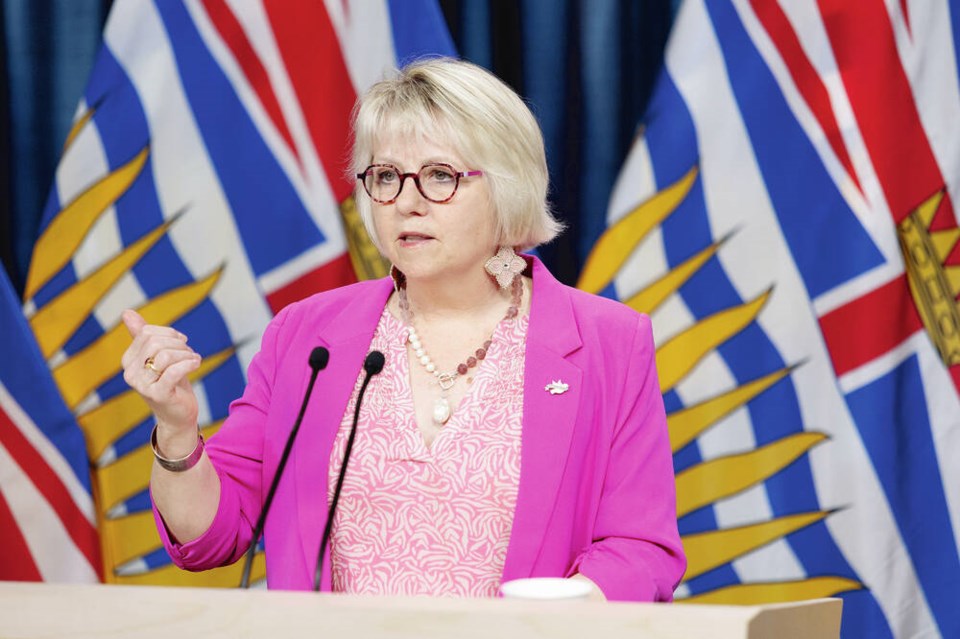ÎÚŃ»´«Ă˝ provincial health officer Dr. Bonnie Henry is reminding parents and guardians as they prepare their kids’ backpacks and outfits for back to school, to also ensure their children’s routine vaccinations are up to date.
Vaccinations are the best way to prevent youth from vaccine-preventable illnesses that can cause serious illness, long-term disability and even death, Henry said.
The start of school means children returning indoors to classrooms, increasing the likelihood of being exposed to illness.
Communicable diseases of most concern include measles, mumps, rubella, polio, pertussis (whooping cough) and chickenpox.
“Now’s the time to make sure people are up to date with their vaccines, because there’s a couple of weeks before school starts again,” Henry said.
For those who need to get their vaccines or update them, health authorities and pharmacists, nurse practitioners and physicians should all have all those vaccines available she said.
In ÎÚŃ»´«Ă˝, routine vaccines begin at infancy — two months through 18 months — against diseases that include chicken pox, diptheria, tetanus, pertussis and polio.
Vaccines, including those against measles, mumps, and rubella, are given when children enter school at age four to six years old.
School-aged children and teens typically receive their routine vaccines at clinics held at schools according to an but they can also get them at public health units, some doctors’ and nurse practitioners’ offices and some pharmacies.
The Vaccination Status Reporting Regulation put into place on July 2019 allows for the collection of immunization records of school-age children by public health officials so that if an outbreak occurs in schools, children who are not fully immunized and protected can be identified.
Immunizations continue in Grades 6 for the HPV vaccine which protects against genital warts and most cases of cervical cancer.
The percentage of Grade 6 female students updated with their HPV vaccines in 2023 was 65 per cent in the south Island, 53.9 in the central island and 47 per cent in the north.
The Island average for Grade 6 females who had their HPV shots was 57 per cent, below the provincial average of 60 per cent. The vaccine was first introduced in 2008-2009 as a three-dose series which became two doses in 2010.
“We’re looking at going to a single dose with the HPV vaccine,” said Henry. “There’s some really great data that’s come out from the World Health Organization and globally that shows that one dose in young people, if you get it early enough, that gives really, really good protection for a long period of time.”
Some of that research was done by Dr. Gina Ogilvy, noted Henry. Ogilvy is a Tier 1 ÎÚŃ»´«Ă˝ Research Chair in Global Control of HPV related diseases and prevention as well as senior public health scientist at the ÎÚŃ»´«Ă˝ Centre for Disease Control.
In Grade 9 students are offered vaccination for protection against meningococcal infection, a sometimes fatal disease, as well updates for tetanus, diptheria and pertussis.
The upcoming respiratory season in the fall through winter will bring more cases of COVID‑19, influenza and other viruses, said Henry.
Henry advises especially young adult students who may be mixing in new larger social groups inside or living in campus housing to consider vaccines against influenza and meningitis as well as an updated dose of the COVID-19 vaccine.
There were 83 test-positive cases of COVID on the Island during the last report week of July 21-July 27, including 20 hospital admissions, four critical care cases and four deaths related to the disease.
Henry said COVID numbers are relatively low in ÎÚŃ»´«Ă˝ right now according to wastewater results. “But I am concerned that it’ll rise again in the in the fall,” said Henry, citing a surge of cases in the United States that has levelled off for now and a bit of a surge in Europe.
“People should be thinking about this in the fall,” said Henry. “We’ll have an updated vaccine, probably in late September, early October, and it’ll be time to get our booster doses for both COVID and influenza as we head into the respiratory season.”
>For more information on ÎÚŃ»´«Ă˝’s immunization schedule for children, go to .
You can register for a COVID-19 vaccine through the provincial system at
>>> To comment on this article, write a letter to the editor: [email protected]



